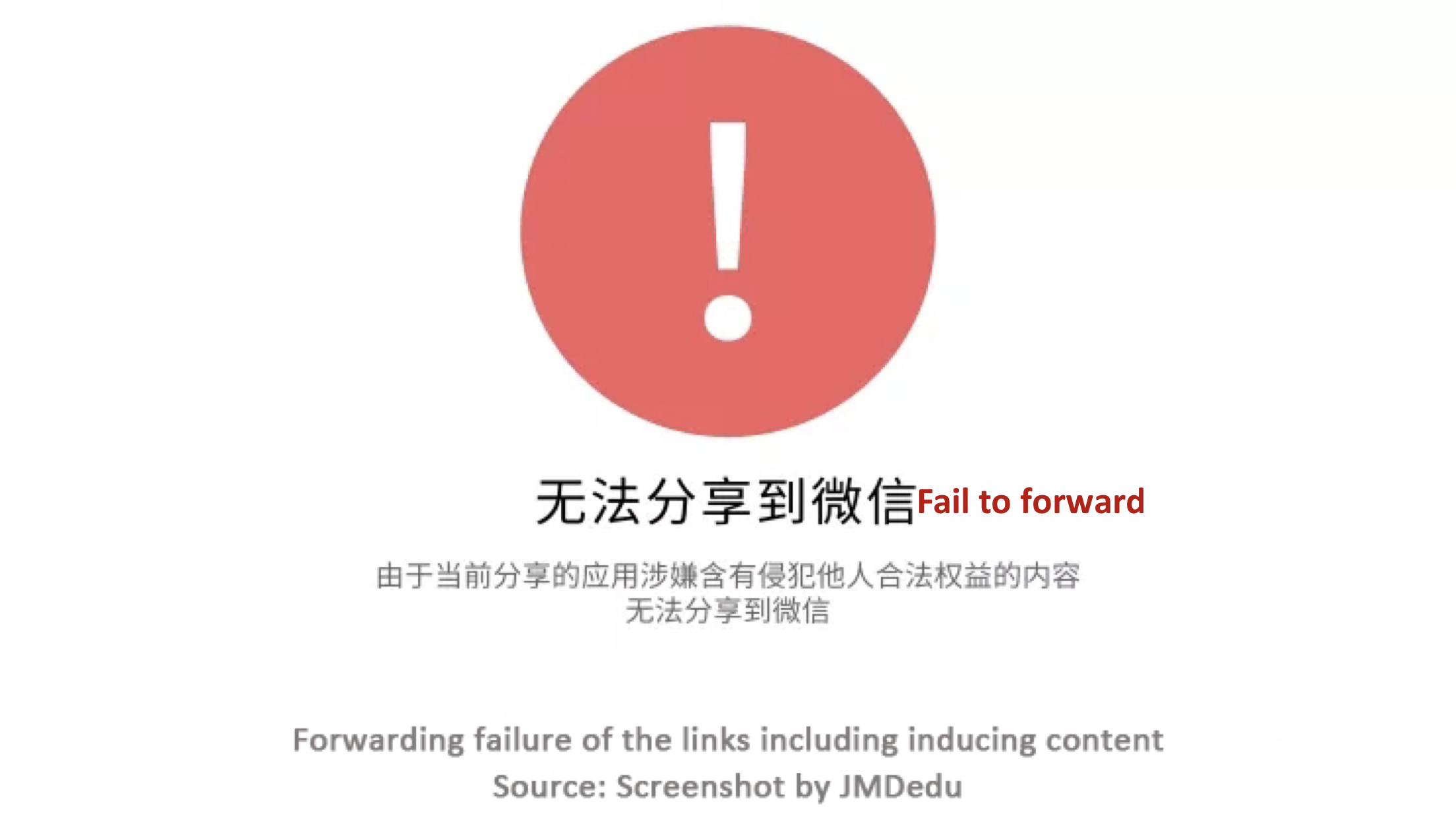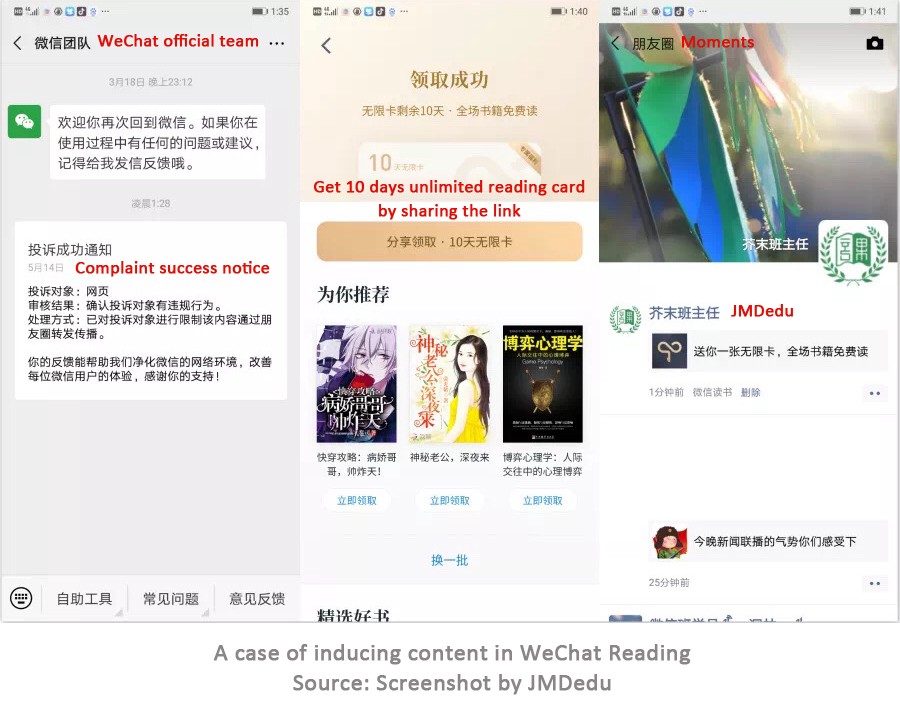 WeChat, the most ubiquitous social media app with over 1 billion active users in China, allows an app ecosystem within itself with services including: social sharing, taxi booking, news and games. Operated by tech giant Tencent, WeChat has officially released the “Announcement against products offering rewards for users to share advertising-related links”(hereinafter referred to as “the Announcement”) on May 13 and once again explicitly prohibited incentivizing users to share posts in WeChat Moments (the social media section). Public and personal accounts who do so will be permanently shut down. Although the regulation has already existed, it is the first time that online educational products are listed as violation instances in the Announcement.
WeChat, the most ubiquitous social media app with over 1 billion active users in China, allows an app ecosystem within itself with services including: social sharing, taxi booking, news and games. Operated by tech giant Tencent, WeChat has officially released the “Announcement against products offering rewards for users to share advertising-related links”(hereinafter referred to as “the Announcement”) on May 13 and once again explicitly prohibited incentivizing users to share posts in WeChat Moments (the social media section). Public and personal accounts who do so will be permanently shut down. Although the regulation has already existed, it is the first time that online educational products are listed as violation instances in the Announcement.
In the last piece of our series “Decoding 2018 China’s Education Market”, it is mentioned that since the edge of leveraging the Internet economy for making profit has weakened, online education in China still has to overcome the obstacle of customer acquisition. In this context, WeChat Moments can be a golden spot for several educational companies to reduce marketing costs and increase effective conversion.
Therefore, this Announcement is undoubtedly a heavy blow for the companies relying too much on the marketing strategies with WeChat Moments. It is not difficult to imagine that these players may have to make adjustments in terms of customer acquisition or even the overall business model. In the long term, does this mean that a new round of reshuffle is coming?
Continuously restrict the access of external links to WeChat
WeChat has fought against companies who enticed users to share marketing links by offering rewards for a long time. According to WeChat’s “External Link Content Management Regulation”(《微信外部链接内容管理规范》), the operations inducing user to share, open or click on the “like” button of official accounts’ articles by rewarding users with money, physical prizes, virtual prizes (E-coupons, vouchers, points, phone bills, phone traffic, etc.) are all banned.
On the basis of the previous rules, the Announcement tightened the boundaries of the regulation once again. “It will be also regarded as an irregularity that external Apps entice users to share marketing contents in WeChat Moments.” This means that the access of external links to the WeChat platform continues to be restricted.
Correspondingly, in penalties for violations, the Announcement has also laid out more rigorous regulations. Besides incentivized marketing links that are banned, WeChat will also stepwise impose restrictions on the violation of the WeChat official accounts or individual users to reduce the daily sharing quota, limit the WeChat login interface, and permanently block the account.
Even through regulations have been carried out repeatedly, there is still a flood of this type of marketing, which just proves that the high cost of acquiring customers is a constant pain point for online companies. Given the huge traffic brought by WeChat, the penalty they are facing of still implementing this marketing strategy is the price they are willing to pay.
Drive more traffic and efficient conversion: Dealt a blow to English learning products

The four violations named by the Announcement are all English learning products: Mint Reading, Liulishuo, Qing Class and Rocket Word with the obvious advertisement “Refund tuition fees” and “Cash refund” in their introduction pages. Apart from the named products, there are many English learning products that have the same marketing strategy to acquire customers by punching in (a way for users to keep records of certain app’s daily usage) and fission marketing.
The reason why English learning products choose WeChat as their battlefield is not difficult to explain: close to users, centralized traffic, and efficient conversion. At the interaction of WeChat ecosystem, paid contents, and community culture, the marketing logic of WeChat punch-in can be summarized as “three steps”: WeChat public account as learning scene, WeChat group chat as community, WeChat social attribute used for brand exposure and customer acquisition. “WeChat Ecosystem + Education”works for quite a few education companies.
For example, Rabbit English (used to be known as Baby English) which has been launched approximately two years by March 2018 set a perfect example for its competitors. The registered number of a training camp can reach 100 thousand; the number of new early users in a single month can exceed 20 thousand; and the number of new paid users in a single month is around 20 thousand. Besides all the marketing methods mentioned above, it officially launched the WeChat Mini-program on January 9, 2017, followed by many educational products, enriching the imagination of “WeChat Ecosystem + Education” model. Thus once the Announcement is strictly carried out, educational products whose customer acquisition is based on WeChat group operating, Moments sharing, and mini-program punch-in will be influenced more or less. In fact, the action of adjusting marketing strategies for some educational products has begun.
Difficult to give up WeChat traffic, change is inevitable
The impact of the Announcement takes place immediately. In addition to the products that have been named, many English learning products such as Jiguang Word, Shuidi Reading have issued public statements on their WeChat official accounts, claiming that after completing the course, users can get bonus without having to share the links to their Moments. The Qing Class even stated that the previous requirement for the users to punch in was because of competition and they had no alternative. And they also said frankly: “Canceling the requirement of punch-in by sharing links in the Moments may make us develop slowly.” Huang Youcan, the co-founder of Sanjieke (an online vocational education product), also mentioned that: “After this blow, for educational products, whether ‘content + services’can create a real reputation rather than rely on rewarding users to create fake reputation will become a key point to win.”
On the other hand, users have different attitudes toward changes in the using experience brought about by the Announcement. A user named Li Daxia commented below the Announcement: “Sharing links to Moments to earn money is the driving force for me to insist on studying.” For this comment, the WeChat official team responded specifically: “This kind of operation (enticed sharing) is actually taking the advantage of users’ learning enthusiasm to achieve the purpose of traffic spread. And the essence is still a malicious marketing way.”
In contrast, users who gave up learning by Mint Reading told JMDedu: “I won’t pay for the product even it can reward me by returning the tuition fee. We need to go back to our real demands instead of becoming Pavlov’s dog.”
Complaint handled fast, yet effect is questioned

At the end of the Announcement, a method for complaining has been given pointing out that contents and related institutions will be handled as soon as it is verified. So JMDedu also tried with WeChat Reading as an example by following the instructions to share the link in WeChat Moments and get a 10-day reading card without the quota limitation.
After more than an hour, JMDedu used another WeChat account complaining about the link which was shared, according to the process in the Announcement. After less than 5 minutes, we were informed that the complaint was successfully handled by the official team with a WeChat message. The notice stated that the object of the complaint was confirmed to be in violation of the rules, and “the content is imposed restrictions on forwarding and spreading through the WeChat Moments”. However, JMDedu found that the link could be opened normally and still can directly jump to the WeChat reading APP to acquire the unlimited card with normal sharing function.
It is worth noting that WeChat Reading app as a product launched by Tencent seems to violate the regulations for the Announcement, but whether WeChat official team’s crackdown on enticed sharing will apply to WeChat Reading or only to other external apps is unknown at the current stage. Or it may take a little while for the measures to be put into effect. And this “little while” may be extremely crucial for many education companies to find initiatives to cope.



